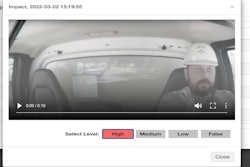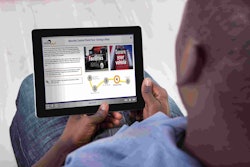A recent survey of small- to medium-size (SMB) fleets performed by Atomik Research on behalf of fleet safety software provider Netradyne revealed that 69% have considered imposing monetary fines to address negative driving behavior.
That’s a statistic that stood out to Netradyne’s Senior Vice President of Marketing Barrett Young because it’s the opposite of Netradyne’s approach to driver management.
“Where I think it was interesting from a Netradyne perspective is that, from our scientific research, the way we position our safety system is quite the opposite,” he said. “It's a little bit of the carrot versus the stick, and how our system is built is really flipping the script.”
Netradyne’s Driveri system uses positive reinforcement to encourage drivers to perform better. The system uses different types of coaching, including real-time micro coaching in the form of in-cab alerts and virtual automated coaching, where safety managers can send weekly videos that demonstrate what the driver has done well and what they need to work on. The system uses advanced AI to analyze 100% of the driving day via cameras as opposed to only recording triggered events, which can result in a slap on the hand when it may deserve a pat on the back because it doesn’t tell the full story.
“If a vehicle brakes really hard, there are multiple different reasons why. It’s looked at as a negative, where our system is actually able to analyze the entire driving day and apply causation. So that vehicle may have braked really hard because someone from another lane cut them off. That's not a negative driving behavior on the driver's part. In fact, that was a positive driving behavior because they braked to avoid an accident,” Young said. “The way that we've been taught to do fleet safety and improve driver behavior is perfectly suited for a world that no longer exists.”
Young said 80% to 90% of the driving day is performed with good driving behavior, but with trigger-based event coaching, negative driving behavior is the only kind that gets addressed rather than acknowledging and rewarding the good driving behavior as well, which is what he said is a psychological approach that ultimately improves driver behavior over time, benefitting fleets in safety, retention and finances.
“We can do this with our children. I think my wife does it with me sometimes, but by reinforcing good behavior, it releases endorphins; it has good feelings, so psychologically, you want more of that. I'm going to go do more of that because I like the way that feels,” Young said. “If you think about the psychology of truck drivers … they're proud people. They're proud of their jobs. They work hard at their jobs – arguably some of the hardest workers in our entire economy. And so the last thing they want is to constantly be told that they're doing the job bad, especially when majority of the time they're not.”









